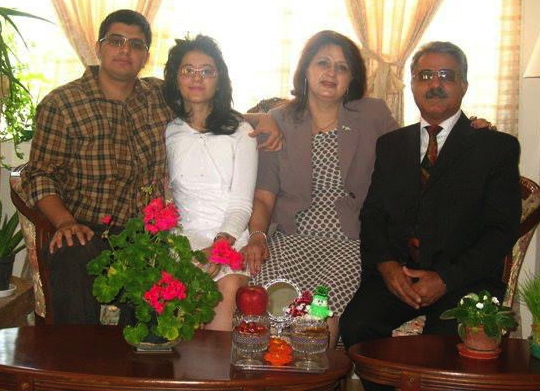Judge Claims Baha’i’s Death Was Suicide, Not Murder

Ataollah Rezvani, 52, was killed by a gunshot to the back of the head in his car on August 24. He was an active member of the Bandar Abbas Baha’i community and a charity worker.
“The investigative judge in the case has a very polite and pleasant attitude, but the case has not had any progress so far. I believe they want to view it as a regular murder or suggest normal theories such as suicide, and no matter how his family insists that they believe this was a murder with a religious and ideological motivation, they pay no attention, which I think is deliberate. We are concerned that they may delay reviewing this case to the point that it may be forgotten,” Navid Aghdasi told the Campaign.
Navid Aghdasi also told the Campaign that the last person who saw Ataollah Rezvani alive has been missing for several days. “An Afghan laborer by the name of Karim was the last person who saw Mr. Rezvani alive before his August 24 death. Karim worked at the home of a Bandar Abbas Baha’i family who was out of the country at the time and Mr. Rezvani used to check on the house occasionally. That night he had gone there and had given a ride to Karim in his car. Unfortunately, it has been 12 days that no one knows about this laborer and he has completely disappeared.”
Ataollah Rezvani, 52, was killed by a gunshot to the back of the head in his car on August 24. He was an active member of the Bandar Abbas Baha’i community and a charity worker. In the 1980s, Rezvani was expelled from Science and Technology University, where he studied Mechanical Engineering, because of his religion during what was called “the Cultural Revolution.” During the last years of his life he sold water pumps in Bandar Abbas. According to Navid Aghdasi, the Bandar Abbas Intelligence Office had asked the Bandar Abbas Water Authority to sever their business dealings with Rezvani and not to allow him to participate in tenders and projects.
“Almost all Baha’is and non-Baha’is in Bandar Abbas believe that Mr. Rezvani was murdered because of his beliefs. We see no financial or honor-related motivations for this murder. At the time of his murder, none of his belongings were stolen, except for his cell phone which wasn’t worth anything. Those who knew Mr. Rezvani knew that he could not have any enemies. He was a generous human being who was very well known not just among the Bandar Abbas Baha’is, but also non-Baha’is,” Aghdasi said.
Asked whether Ataollah Rezvani had been threatened prior to his death, his cousin said, “Mr. Rezvani was a very discreet man and I believe that even if he was threatened, he didn’t say anything so as not to worry his family and friends. But some of the threats made against him were public and we knew about them as well. For example, the Bandar Abbas Intelligence Office had forced his clients not to work with him, or, when other Baha’is were summoned to the Bandar Abbas Intelligence Office for interrogations, Mr. Rezvani’s name was also mentioned during their interrogations and he was somehow threatened, and when the Baha’is returned they would tell us these things. Also, the Bandar Abbas Friday Imam had repeatedly, and particularly a few days before Mr. Rezvani’s murder, spoken against the Baha’i community in his sermons. All of these are our points. Several other Bahai’s were previously threatened and mistreated as well.”
The International Baha’i Community said in a press release on August 27, “[I]t is now clear that the murder in Iran of Mr. Ataollah Rezvani was religiously motivated.” The International Baha’i Community has asked President Hassan Rouhani to deliver on his promise to facilitate human rights.
“For more than 30 years, the Islamic Republic of Iran has systematically persecuted Baha’is, solely because of their religious beliefs, which promote peace, obedience to law and pose no threat to the government,” Bani Dugal, the Senior Representative of the Baha’i International Community at the United Nations, said in a September 25 press release. “We are hoping that President Rouhani will take steps to accord to the Baha’is their full rights as Iranian citizens.”






